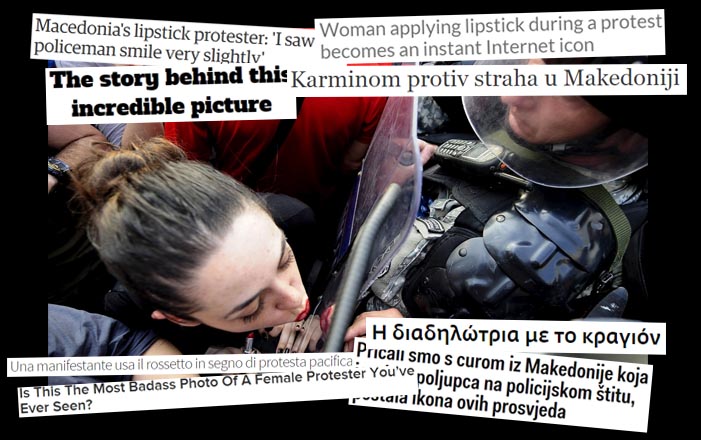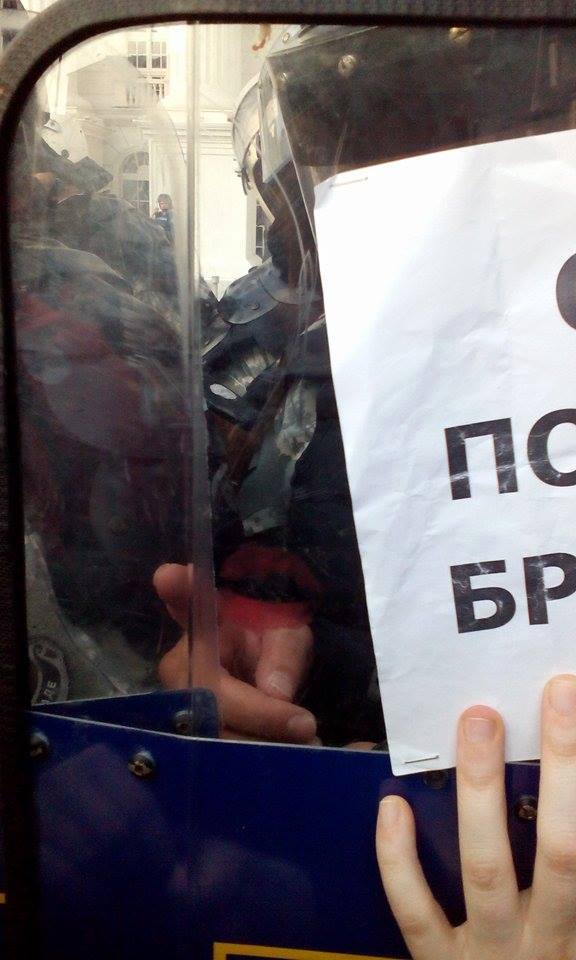
The image of protester Jasmina Golubovska taken by Reuters photographer Ognen Teofilovski quickly went viral on the Internet and remains one of the symbols of the on-going anti-government protests in Macedonia.
Mass protests erupted in Macedonia's capital on May 5, 2015, after opposition leaders released damning audio recordings of conversations between the country's top officials. In them, Macedonian Prime Minister Nikola Gruevski and Minister of Interior Gordana Jankuloska appeared to be discussing ways of covering up the death of a 22-year-old man, who had died as a result of injuries in an altercation with police in 2011. The officer involved was later convicted, the ruling showing evidence of excessive force.
In response, 5,000 people took to the streets of the capital Skopje. Five hours into a demonstration many eyewitnesses and international reports have described as peaceful, police cracked down, bringing out water cannons into the streets as warning and using excessive force and batons to disperse it.
As mass gatherings demanding the resignation and prosecution of several government officials involved in the Martin Neshkovski case continued throughout the country, images of the protests began making rounds on the Internet and international news. Some images stood out more than others.
On that first day of protests, a police cordon was guarding the main government building in downtown Skopje. As hundreds of people poured past, a Reuters photographer stood perched on a step next to the building for a better view of the crowd. Below him, a young woman approached the police cordon, and as the crowd of protesters shouted around her, she reapplied her red lipstick using one of the riot police officer's shields to view her reflection. As the photographer pointed his camera at her and snapped away, she left a bright red kiss print on the officer's shield.
This woman is everything pic.twitter.com/XKySELebVT
— Molly Crabapple (@mollycrabapple) Mayo 6, 2015
Her name is Jasmina Golubovska and the image of her reapplying her lipstick in the midst of an anti-government protest has wrapped itself around the globe several times over, getting play on viral websites such as Daily Dot and BuzzFeed as well as major international news outlets. To some she is a “badass”, to others “an icon” of the protests in Macedonia.
But Golubovska was not just a random woman touching up her makeup on the front lines of civic resistance: she is a rights activist and a representative of the Helsinki Committee for Human Rights in Macedonia.
Along with others, Golubovska has been vigorously lobbying for amendments to some of Macedonia's more dubious legislation and speaking out publicly against human rights violations in the country for years.
Global Voices reached out to Golubovska and spoke to her about the history and future of ongoing protests in one of Europe's most impoverished countries:
Global Voices (GV): We know that the final trigger for the current mass protests were the leaked conversations between Prime Minister Gruevski and Interior Minister Jankuloska related to the 2011 death of 22-year-old Neshkovski. But taking a long-term view, what do you feel led to these protests demanding the current government's resignation? And do you believe that in leaking the audio recordings the opposition is attempting to create “public unrest”, as Prime Minister Gruevski claims?
Jasmina Golubovska (JG): There are more than a few reasons the revolt has spilled onto the streets which the so-called government and ruling parties did not take into consideration since they were too busy with their need for profit and establishment of full control over society.
First, the aggressive propaganda over the nine years of [Gruevski's] rule to divide civil society by labeling, creating mistrust among citizens, and forcing the idea of internal and external threats to the security of the nation has failed and backfired. Overwhelming exposure to nationalistic and religious propaganda through editorial control over national media, [intended to] present the executive branch as devoted patriots did not correspond with the real life of the citizens.
Second, the parties in power leaned too much on commercialization and marketing of their ideals and presented their “successes” as grandiose and perfect, while poverty took its toll on the citizens.
Third, aggressive tax policies that gradually increased obligation while limiting [citizen's] rights to social and health security, enormous fines, and penalties not corresponding with the living standard of people working for minimum wage. Nine percent of the population lives under the poverty line at two dollars per day, which increased the revolt of citizens.
Finally, open oppression and attempts to establish full control over society by reforming the educational system, especially attempting to override the autonomy of the State University was the final drop. In January of this year, students renounced the autonomy of the University, challenging the Ministry of Education and Science to back off the idea to examine the knowledge of students and diminish the role of the professors. The same ministry also applied its authority to elementary and middle schools which backfired with protests and boycotting of the new testing in high schools throughout the country.
As we speak, the kids are in tents in front of the Ministry's building. There were many issues throughout these nine years worth mentioning, so I will reflect on just a few non-formal movements: Prva Arhi Brigade and Ploshtad Sloboda in 2009, Stop Police Brutality following the Martin Neshkovski incident in 2011, Sloboden Index [protesting new university-related legislature] in 2009, Aman [protesting new utility price hikes] in 2013 and 2014, Parkobrani [to save the city parks from government construction projects] in 2013, eco-movements in many cities demanding clear air and improvement of ecological standards, women-driven movements against misogyny, the rise of workers’ rights movements, independent syndicates creating a social front, the case of little Tamara Dimovska who died due to limited [public] access to the state health insurance fund, people falling victim to police brutality, cases of torture in closed institutions, lack of transparent court proceedings, crime rates increased by up to 50% despite huge investments in the Ministry for Interior, lack of respect for voters rights in the election process, and so on.
These and many other events are the reason for the unrest, while the wiretapped conversations just confirmed our suspicions in regards to the ruling parties.
GV: Let's go straight to the question everyone has been asking upon seeing the viral image of you reapplying your lipstick in the police officer's shield during the protests — whatever possessed you to do that? Was it planned ahead of time or did it just come to you? Did you exchange any words with the officer?
JG: As we stood there, face to face for around two hours before we were dispersed on the streets, all of us tried to appeal to them to drop their shields and join us by disobeying their orders due to the fact that their obligation is to protect citizens. In other words, citing the Constitution as the highest legal act and the contract between the state and the people. We will continue to ask police to join us and not to forget that when they go home [after the protests], they are also civilians with families and a life that matters.
The red color is not an accident. It represents the people's struggle in poverty and a lack of workers’ rights. It just so happened at that moment that I had red lipstick in my bag, while the idea came up in conversation with a friend of mine, Biljana Ginova. I tried to draw a heart, but the police officer was reluctant, so he got a kiss instead, in remembrance of the lost lives of victims to the regime, including Martin Neshkovski's.

Standing in the frontlines of the protest on May 5, 2014, Golubovska's friend captured the red kiss left on the police officer's shield. Photo by Kire Vasilev, courtesy of Jasmina Golubovska, used with permission.
GV: Protests often look very different from the outside than they do when you are standing in a sea of fellow protesters. Most people under 45 in the Balkans have probably walked in at least one major protest, but others aren't familiar with that feeling. Can you elaborate a little on the atmosphere and sentiment you have personally sensed from these protests?
JG: The protests allow us to meet with each other and exchange opinions, even grieve for lives lost in vain. For example, collective grieving for the lost lives of eight police officers and many injured [in the incidents in Kumanovo due to the breach of security of the State, helped many people to release [themselves from] the tension and fear of far darker scenarios that were presented in the pro-government media outlets.
People need to understand that by staying at home they cannot express their revolt and will only affect their health [negatively]. By coming to the protests they can feel empathy and solidarity with their problems, from people who actually care and understand them since they are in the same or similar situations as well.
GV: Do you have any insight into how things might develop from here? Social networks tell us that the protests are planned to carry on throughout May and perhaps into the summer. Do you feel things will escalate or that these protests will result in some sort of permanent change?
JG: There is too much speculation via media outlets building on the political crisis. However, what civil society is demanding is a new beginning, a start from scratch. I like to associate that start with the formatting of our computers. You press “format disk” and start all over again, this time including the demands of the movements and interest of the citizens mentioned in the first question. Our people deserve a country based on the principles of peace, justice, and social solidarity. They need a new chance to live freely and in prosperity. In regards to escalation of the protests, no one can know for sure due to the fast development of the political and security crisis. Things are changing as we speak, but the people need to stand behind their demands for government resignation and accountability of all.
Protests continue in major cities in Macedonia every day, from 18:00 local time. On Sunday, May 17, 2015, Macedonia's political opposition, which has boycotted parliament since May 2014, claiming fraud in the electoral victory of Gruevski's party, led more mass protests. Various sources estimate that between 60,000 and 80,000 people were present at the united opposition and civilian-led protests in Skopje on Sunday, demanding resignations and criminal investigations of top government officials.







3 comments
Only in F.y.r.o.m……..